高一英语语法复习_必修三
- 格式:doc
- 大小:183.50 KB
- 文档页数:26
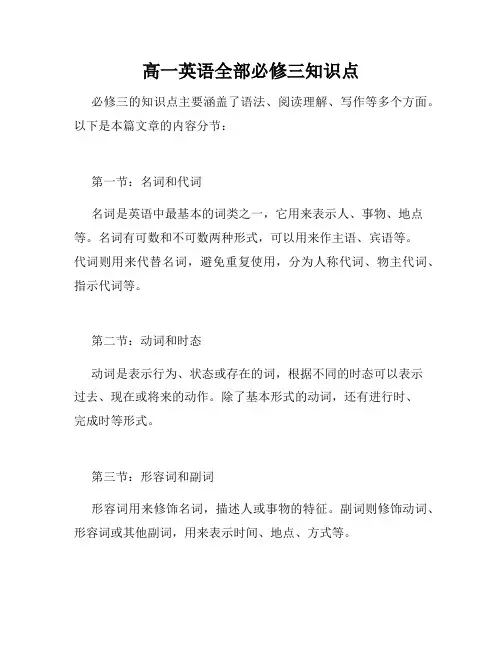
高一英语全部必修三知识点
必修三的知识点主要涵盖了语法、阅读理解、写作等多个方面。
以下是本篇文章的内容分节:
第一节:名词和代词
名词是英语中最基本的词类之一,它用来表示人、事物、地点等。
名词有可数和不可数两种形式,可以用来作主语、宾语等。
代词则用来代替名词,避免重复使用,分为人称代词、物主代词、指示代词等。
第二节:动词和时态
动词是表示行为、状态或存在的词,根据不同的时态可以表示
过去、现在或将来的动作。
除了基本形式的动词,还有进行时、
完成时等形式。
第三节:形容词和副词
形容词用来修饰名词,描述人或事物的特征。
副词则修饰动词、形容词或其他副词,用来表示时间、地点、方式等。
第四节:介词和连词
介词用于引导名词或代词与其他词之间的关系,表达位置、时间、方式等。
连词则用来连接句子或句子的部分,起到衔接的作用。
第五节:从句和复合句
从句是一个句子中的一部分,由连词引导,可以在句子中作主语、宾语或其他成分。
复合句由一个主句和一个或多个从句组成,句子结构更加复杂。
第六节:阅读理解和写作
阅读理解是对文章进行理解和分析,包括理解主旨、推理、推
断等。
写作则是用英语进行表达的能力,需要掌握句子结构、词
汇运用、语法规则等。
总结:
必修三的知识点涵盖了英语的基础语法、阅读理解和写作技巧。
掌握这些知识点对于学习英语、提高英语水平至关重要。
通过系
统地学习和实践,我们可以逐渐提升自己的英语能力,并在日常
生活和学习中灵活运用。
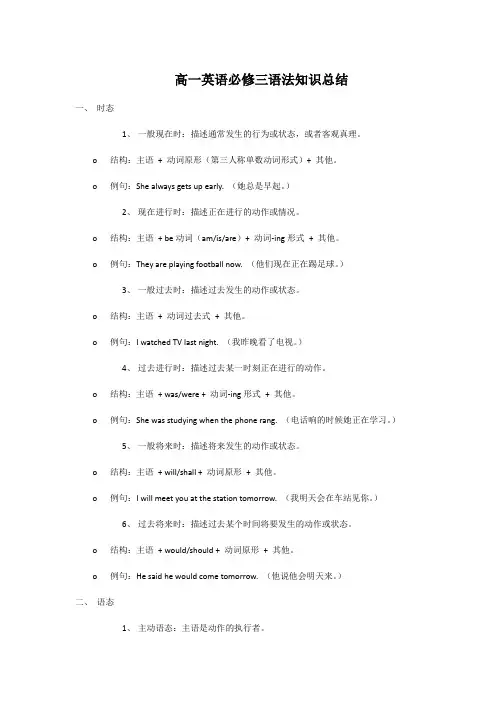
高一英语必修三语法知识总结一、时态1、一般现在时:描述通常发生的行为或状态,或者客观真理。
o结构:主语+ 动词原形(第三人称单数动词形式)+ 其他。
o例句:She always gets up early. (她总是早起。
)2、现在进行时:描述正在进行的动作或情况。
o结构:主语+ be动词(am/is/are)+ 动词-ing形式+ 其他。
o例句:They are playing football now. (他们现在正在踢足球。
)3、一般过去时:描述过去发生的动作或状态。
o结构:主语+ 动词过去式+ 其他。
o例句:I watched TV last night. (我昨晚看了电视。
)4、过去进行时:描述过去某一时刻正在进行的动作。
o结构:主语+ was/were + 动词-ing形式+ 其他。
o例句:She was studying when the phone rang. (电话响的时候她正在学习。
)5、一般将来时:描述将来发生的动作或状态。
o结构:主语+ will/shall + 动词原形+ 其他。
o例句:I will meet you at the station tomorrow. (我明天会在车站见你。
)6、过去将来时:描述过去某个时间将要发生的动作或状态。
o结构:主语+ would/should + 动词原形+ 其他。
o例句:He said he would come tomorrow. (他说他会明天来。
)二、语态1、主动语态:主语是动作的执行者。
o例句:She reads a book every day. (她每天读一本书。
)2、被动语态:主语是动作的承受者,常由“be动词+ 动词过去分词”构成。
o例句:The book was read by her every day. (这本书被她每天阅读。
)三、直接引语和间接引语1、直接引语:直接引用别人的原话。
o例句:She said, “I am going to the market.”2、间接引语:转述别人的话,需要用不同的时态和人称。
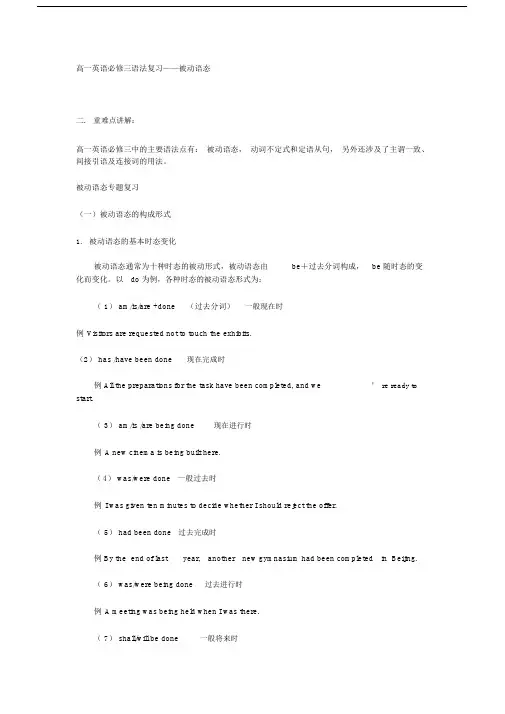
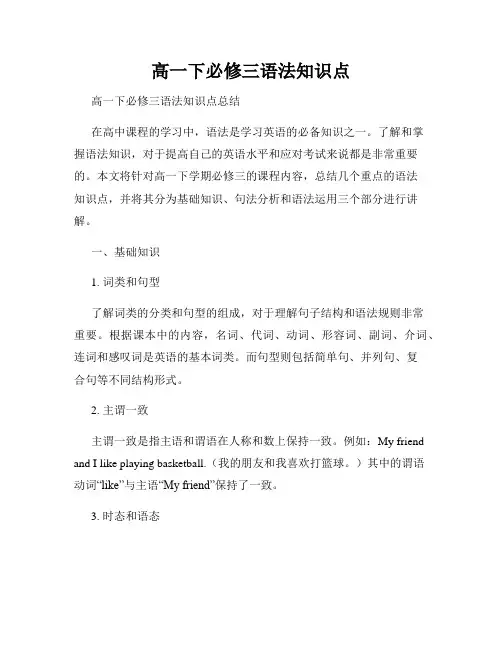
高一下必修三语法知识点高一下必修三语法知识点总结在高中课程的学习中,语法是学习英语的必备知识之一。
了解和掌握语法知识,对于提高自己的英语水平和应对考试来说都是非常重要的。
本文将针对高一下学期必修三的课程内容,总结几个重点的语法知识点,并将其分为基础知识、句法分析和语法运用三个部分进行讲解。
一、基础知识1. 词类和句型了解词类的分类和句型的组成,对于理解句子结构和语法规则非常重要。
根据课本中的内容,名词、代词、动词、形容词、副词、介词、连词和感叹词是英语的基本词类。
而句型则包括简单句、并列句、复合句等不同结构形式。
2. 主谓一致主谓一致是指主语和谓语在人称和数上保持一致。
例如:My friend and I like playing basketball.(我的朋友和我喜欢打篮球。
)其中的谓语动词“like”与主语“My friend”保持了一致。
3. 时态和语态在英语中,时态是表示动作发生时间的一种形式,常见的时态有一般现在时、一般过去时、一般将来时等。
而语态则是表示句子主语是动作的执行者还是承受者,常见的语态有主动语态和被动语态。
二、句法分析1. 主语和宾语主语是句子中指出动作的执行者或者是句子所陈述的事物或概念。
宾语则是动作的承受者或者是句子中受到动作影响的人或物。
了解主语和宾语的概念和识别方法,可以帮助我们分析句子的结构。
2. 定语从句定语从句是指对前面的名词或代词进行修饰或限制的从句。
一般以关系代词(如that, which, who, whom, whose)或关系副词(如where, when, why)引导。
例如:I have a friend who speaks fluent French.(我有一个朋友他说流利的法语。
)其中的“who speaks fluent French”就是一个定语从句。
3. 状语从句状语从句是指用来修饰主句动作或情况的从句。
常见的状语从句有时间状语从句、地点状语从句、条件状语从句等。
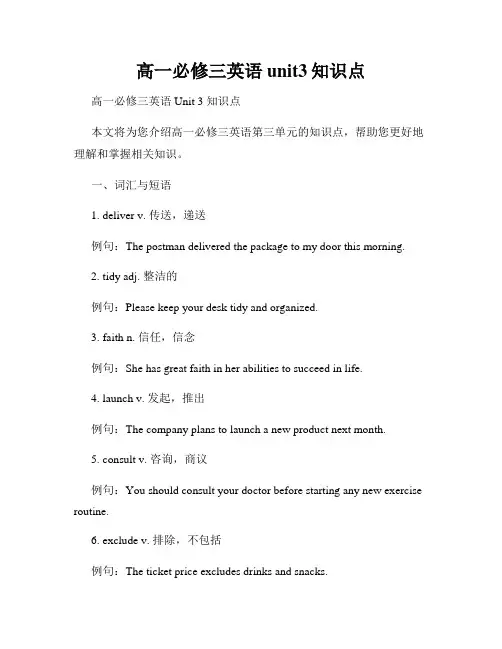
高一必修三英语unit3知识点高一必修三英语Unit 3 知识点本文将为您介绍高一必修三英语第三单元的知识点,帮助您更好地理解和掌握相关知识。
一、词汇与短语1. deliver v. 传送,递送例句:The postman delivered the package to my door this morning.2. tidy adj. 整洁的例句:Please keep your desk tidy and organized.3. faith n. 信任,信念例句:She has great faith in her abilities to succeed in life.4. launch v. 发起,推出例句:The company plans to launch a new product next month.5. consult v. 咨询,商议例句:You should consult your doctor before starting any new exercise routine.6. exclude v. 排除,不包括例句:The ticket price excludes drinks and snacks.7. accompany v. 陪同,伴随例句:I'll accompany you to the airport so that you won't get lost.8. focus n. 焦点,重点例句:The meeting's focus will be on the company's future expansion plans.9. transfer v. 转移,调动例句:He was transferred to the company's branch office in New York.10. obtain v. 获得,得到例句:You can obtain a copy of the report from the receptionist.二、语法知识1. 动词的时态和语态英语动词有多种时态和语态,如一般现在时、一般过去时、现在进行时、过去进行时、一般将来时、被动语态等。
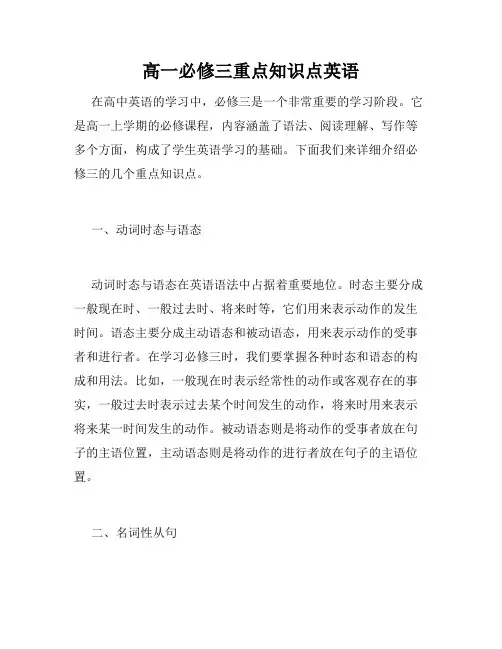
高一必修三重点知识点英语在高中英语的学习中,必修三是一个非常重要的学习阶段。
它是高一上学期的必修课程,内容涵盖了语法、阅读理解、写作等多个方面,构成了学生英语学习的基础。
下面我们来详细介绍必修三的几个重点知识点。
一、动词时态与语态动词时态与语态在英语语法中占据着重要地位。
时态主要分成一般现在时、一般过去时、将来时等,它们用来表示动作的发生时间。
语态主要分成主动语态和被动语态,用来表示动作的受事者和进行者。
在学习必修三时,我们要掌握各种时态和语态的构成和用法。
比如,一般现在时表示经常性的动作或客观存在的事实,一般过去时表示过去某个时间发生的动作,将来时用来表示将来某一时间发生的动作。
被动语态则是将动作的受事者放在句子的主语位置,主动语态则是将动作的进行者放在句子的主语位置。
二、名词性从句名词性从句是一种用来充当句子成分的从句,它可以在句子中充当主语、宾语、表语等。
在必修三中,我们要熟练掌握名词性从句的几种常见形式,如主语从句、宾语从句、表语从句和同位语从句等。
在句子中使用名词性从句可以使句子结构更加复杂,意思更加明确。
比如,在上面的句子中,“名词性从句是一种用来充当句子成分的从句”就是一个名词性从句,充当了主语的角色。
三、时态与语态的复合运用在实际语言使用中,我们经常会遇到时态和语态的复合使用。
例如,过去完成时和一般过去时的组合,表示在过去某个时间点之前已经完成的动作;将来完成时和将来时的组合,表示将来某个时间点之前已经完成的动作。
被动语态和时态的复合使用也是非常常见的,如一般现在时的被动语态,表示现在经常性的被动动作。
在学习必修三时,我们要注意这些组合的使用,从而使语言表达更加准确。
四、写作技巧的提高在学习必修三的过程中,我们还要注重提高写作技巧。
写作是英语学习的重要组成部分,通过写作可以提高我们的语言表达能力和思维能力。
在写作过程中,我们要注意选取适当的词汇、句子结构和语法,使文章流畅、连贯。
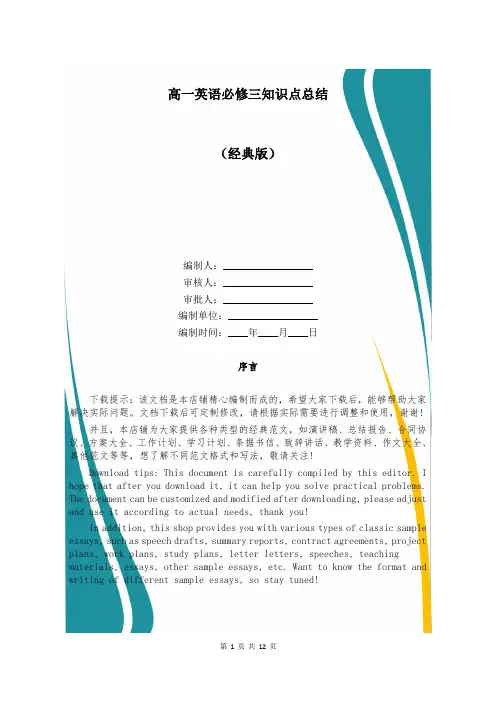
高一英语必修三知识点总结(经典版)编制人:__________________审核人:__________________审批人:__________________编制单位:__________________编制时间:____年____月____日序言下载提示:该文档是本店铺精心编制而成的,希望大家下载后,能够帮助大家解决实际问题。
文档下载后可定制修改,请根据实际需要进行调整和使用,谢谢!并且,本店铺为大家提供各种类型的经典范文,如演讲稿、总结报告、合同协议、方案大全、工作计划、学习计划、条据书信、致辞讲话、教学资料、作文大全、其他范文等等,想了解不同范文格式和写法,敬请关注!Download tips: This document is carefully compiled by this editor. I hope that after you download it, it can help you solve practical problems. The document can be customized and modified after downloading, please adjust and use it according to actual needs, thank you!In addition, this shop provides you with various types of classic sample essays, such as speech drafts, summary reports, contract agreements, project plans, work plans, study plans, letter letters, speeches, teaching materials, essays, other sample essays, etc. Want to know the format and writing of different sample essays, so stay tuned!高一英语必修三知识点总结学习是一个坚持的过程,它就如一个秤,公平而又庄重,你只有努力,让自己变得优秀,才能站在舞台上闪闪发光。
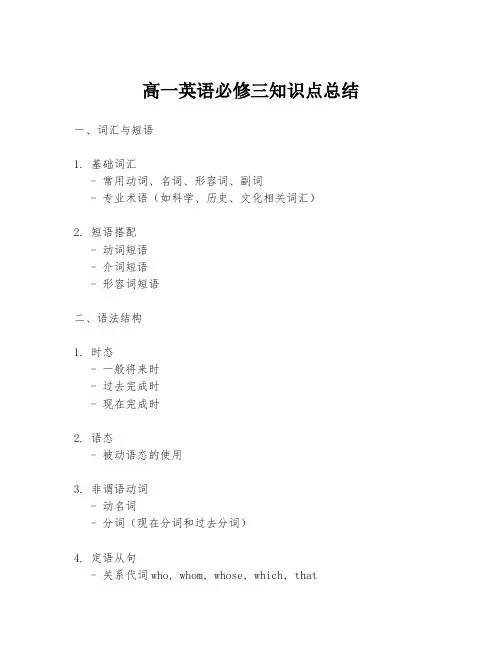
高一英语必修三知识点总结一、词汇与短语1. 基础词汇- 常用动词、名词、形容词、副词- 专业术语(如科学、历史、文化相关词汇)2. 短语搭配- 动词短语- 介词短语- 形容词短语二、语法结构1. 时态- 一般将来时- 过去完成时- 现在完成时2. 语态- 被动语态的使用3. 非谓语动词- 动名词- 分词(现在分词和过去分词)4. 定语从句- 关系代词who, whom, whose, which, that- 定语从句的省略5. 状语从句- 时间状语从句- 条件状语从句- 原因状语从句三、阅读理解1. 快速阅读技巧- 略读(Skimming) - 扫读(Scanning)2. 深度阅读策略- 主旨大意- 推理判断- 作者意图四、写作技巧1. 写作结构- 引言- 正文- 结尾2. 写作类型- 描述性写作- 议论性写作- 叙事性写作3. 写作技巧- 过渡词的使用- 句子结构的多样性 - 段落的连贯性五、听力技巧1. 听力理解- 对话理解- 短文理解2. 听力策略- 预测- 关键词捕捉- 信息整合六、口语表达1. 发音- 音标学习- 发音规则2. 口语交际- 日常对话- 情景交际3. 口语技巧- 语调变化- 停顿与连读七、文化意识1. 文化知识- 英语国家的节日与习俗- 英语国家的地理与历史2. 文化差异- 中西方文化对比- 文化习俗的理解与尊重八、学习策略1. 自主学习- 目标设定- 时间管理2. 合作学习- 小组讨论- 项目合作3. 评价与反思- 学习成果的自我评价- 学习过程的反思与调整请将以上内容复制到Word文档中,并根据实际需要进行格式设置,如标题加粗、分点符号的使用、段落缩进等,以确保文档的专业性和可读性。
您可以根据具体的教学大纲或课程要求,对上述内容进行适当的增删和调整。
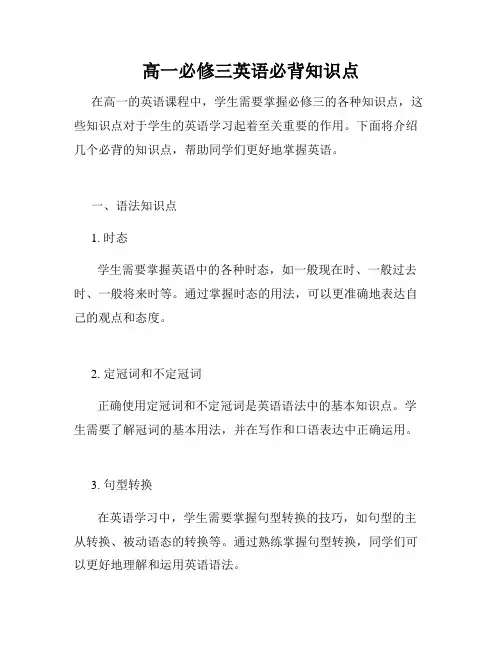
高一必修三英语必背知识点在高一的英语课程中,学生需要掌握必修三的各种知识点,这些知识点对于学生的英语学习起着至关重要的作用。
下面将介绍几个必背的知识点,帮助同学们更好地掌握英语。
一、语法知识点1. 时态学生需要掌握英语中的各种时态,如一般现在时、一般过去时、一般将来时等。
通过掌握时态的用法,可以更准确地表达自己的观点和态度。
2. 定冠词和不定冠词正确使用定冠词和不定冠词是英语语法中的基本知识点。
学生需要了解冠词的基本用法,并在写作和口语表达中正确运用。
3. 句型转换在英语学习中,学生需要掌握句型转换的技巧,如句型的主从转换、被动语态的转换等。
通过熟练掌握句型转换,同学们可以更好地理解和运用英语语法。
二、词汇知识点1. 同义词和反义词学生需要积累常用的同义词和反义词,扩展自己的词汇量。
通过学习和掌握同义词和反义词,同学们可以更加灵活地运用词汇,提高自己的表达能力。
2. 常用短语学生需要掌握常用的短语,如动词短语、名词短语等。
这些常用短语在英语交流中非常常见,熟练掌握它们可以提高同学们的口语和写作表达能力。
3. 词根词缀运用词根词缀的方法,可以帮助学生更轻松地理解和记忆词汇。
学生需要了解常见的词根词缀,并通过积累和运用词汇来提高自己的英语能力。
三、阅读知识点1. 阅读技巧在高一英语必修三中,阅读理解是一个重要的考点。
学生需要掌握一些阅读技巧,如快速浏览、略读和精读等。
通过掌握这些技巧,同学们可以更好地理解和分析文章内容。
2. 题型解析学生需要了解常见的阅读理解题型,如主旨题、细节题、推理题等,并通过练习和解析来提高自己的阅读能力。
四、写作知识点1. 作文结构学生需要掌握作文的基本结构,如引言、主体和结尾,并在实践中不断提高自己的写作能力。
2. 时态运用在写作中,正确运用不同的时态可以使文章更加准确和流畅。
同学们需要熟悉各种时态的用法,并在写作中加以应用。
3. 连词和过渡词同学们需要了解一些常用的连词和过渡词,如and、but、however等。
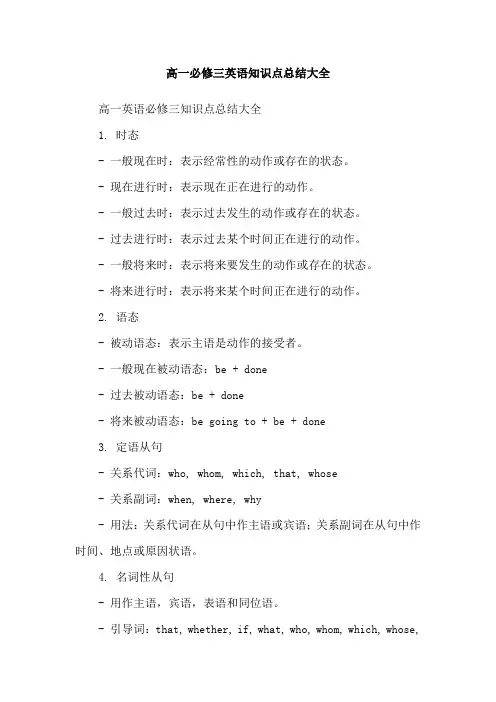
高一必修三英语知识点总结大全高一英语必修三知识点总结大全1. 时态- 一般现在时:表示经常性的动作或存在的状态。
- 现在进行时:表示现在正在进行的动作。
- 一般过去时:表示过去发生的动作或存在的状态。
- 过去进行时:表示过去某个时间正在进行的动作。
- 一般将来时:表示将来要发生的动作或存在的状态。
- 将来进行时:表示将来某个时间正在进行的动作。
2. 语态- 被动语态:表示主语是动作的接受者。
- 一般现在被动语态:be + done- 过去被动语态:be + done- 将来被动语态:be going to + be + done3. 定语从句- 关系代词:who, whom, which, that, whose- 关系副词:when, where, why- 用法:关系代词在从句中作主语或宾语;关系副词在从句中作时间、地点或原因状语。
4. 名词性从句- 用作主语,宾语,表语和同位语。
- 引导词:that, whether, if, what, who, whom, which, whose,when, where, why, how等。
5. 倒装句- 完全倒装:表示地点、时间或方向的副词位于句首时,主语和谓语动词要倒装。
- 部分倒装:只把助动词、情态动词或be动词放在主语之前。
6. 状语从句- 时间状语从句:when, while, as, before, after, by the time, as soon as, until, unless等。
- 地点状语从句:where- 原因状语从句:because, since, as, now that, due to, owing to等。
- 目的状语从句:so that, in order that- 结果状语从句:so that, so...that, such...that- 条件状语从句:if, unless, as long as, provided that, on condition that等。
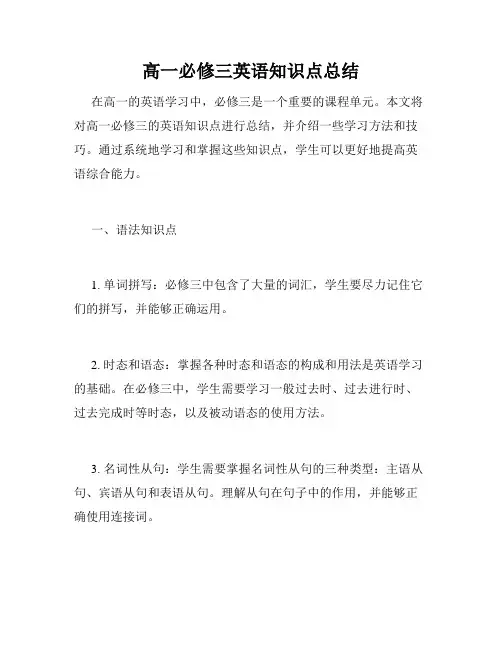
高一必修三英语知识点总结在高一的英语学习中,必修三是一个重要的课程单元。
本文将对高一必修三的英语知识点进行总结,并介绍一些学习方法和技巧。
通过系统地学习和掌握这些知识点,学生可以更好地提高英语综合能力。
一、语法知识点1. 单词拼写:必修三中包含了大量的词汇,学生要尽力记住它们的拼写,并能够正确运用。
2. 时态和语态:掌握各种时态和语态的构成和用法是英语学习的基础。
在必修三中,学生需要学习一般过去时、过去进行时、过去完成时等时态,以及被动语态的使用方法。
3. 名词性从句:学生需要掌握名词性从句的三种类型:主语从句、宾语从句和表语从句。
理解从句在句子中的作用,并能够正确使用连接词。
4. 倒装句:了解倒装句的构成和用法,包括完全倒装和部分倒装。
学生应注意倒装句的特殊情况和常见错误。
5. 非谓语动词:熟练掌握不定式、动名词和分词的构成和用法,特别是在句子中做主语、宾语、定语和状语的情况。
二、阅读理解技巧1. 预览:在阅读一篇文章之前,预览标题、副标题、图片和图表,获取文章的主题和大意。
2. 审题:在做阅读理解题时,仔细阅读问题和选项,确保自己理解正确。
3. 多种阅读方法:根据不同的题型,运用不同的阅读方法,如扫读、精读和略读。
同时,注意文章的结构和段落之间的关联。
4. 词汇猜测:通过上下文猜测生词的意思,避免频繁查字典,提高阅读速度和理解能力。
5. 注意细节:细致地阅读文章中的细节,特别是数字、地点、人物和事件等重要信息。
三、写作技巧和表达能力1. 提炼观点:学会将自己的观点或论据简洁明确地表达出来,并且结合具体事实和例子进行支撑。
2. 逻辑连贯:文章中的每个段落和句子应该有明确的逻辑关系,确保文章的结构和推理合理。
3. 词汇和句型丰富:运用丰富的词汇和多样的句型,使文章更加生动有趣。
4. 注意语法和拼写:写作过程中要注意语法错误和拼写错误的修正,这需要对语法知识和常用词汇的掌握。
5. 大量练习:通过大量的写作练习来提高写作能力,同时经常读英文文章和书籍来积累写作素材和表达方式。
高一英语必修三知识点归纳高一英语必修三学问点篇一1. While still a student, she played roles in many plays.连词+ 名词做时间状语2. When asked about the secret of his success, Steven Spielberg said 连词+过去分词做时间状语3. When drinking to someones health, you raise your glasses. 连词+ 此时此刻分词做时间状语4. Its a custom in China to have some tea before the meal is served. It 做形式主语5. Many people like this film not just because..., but alsobecause... 并列连词6. Having good table manners means knowing...动名词做主宾语高一英语必修三学问点篇二1. wear, put on, have on, dress, be in, try on(1) wear v. 穿着;戴;蓄须(发);磨损;(脸容)呈现,显出He is wearing an overcoat today.* wear out (把) 穿破;(把) 用坏;(使) 疲乏;(使) 耗尽I have worn out my shoes. / My patience wore (was worn) out.(2) put on 穿上;戴上(侧重穿着的动作)Put on your sweater, otherwise you will feel cold.(3) dress vt. 给穿衣服n. 衣服;连衣裙dress sb. (in sth.) 或be dressed (in sth.) 留意:穿的衣服接在in 之后。
高中英语必修三知识点总结必修三是高中英语课程中的重要部分,以下是必修三的知识点总结:1. 短语和表达:- 在乡下 in the countryside- 城市生活 city life- 长期住在某地 live in a place for a long time- 对……感到尴尬 feel embarrassed about- 填写表格 fill in the form- 把……吓坏 frighten/terrify sb.- 以…为基础 based on- 适应新的环境 adapt to the new environment- 遇到困难 encounter difficulties- 取得进步 make progress- 处理问题 deal with problems2. 语法和句型:- 宾语从句宾语从句是一个由连词引导的句子,作为主句的宾语。
eg. I think that he is a good teacher.我认为他是一个好老师。
- 定语从句定语从句用来修饰一个名词或代词,并且不可单独成句。
eg. The girl who is sitting next to me is my best friend.坐在我旁边的那个女孩是我的好朋友。
3. 阅读理解:- 阅读理解是考察学生对一篇文章的理解和推理能力的题型。
- 解题步骤包括:快速浏览文章,查找目标信息,理清文章结构,注意上下文关联。
4. 写作技巧:- 通过阅读和写作来提高英语水平。
- 练写作应遵守语法和拼写规则,注意表达的准确性。
- 多阅读英语文章,积累词汇和句型,以提高写作能力。
希望以上总结对你有帮助!。
高一英语第三册语法知识点在高一英语第三册中,有许多重要的语法知识点需要我们掌握。
本文将详细介绍其中一些知识点,帮助同学们更好地理解和运用。
一、时态和语态1. 一般现在时:用于表述客观事实和习惯动作, 如“Water boils at 100 degrees Celsius.”2. 一般过去时:用于过去发生并结束的动作, 如“I finished my homework last night.”3. 一般将来时:用于表示将来某个时间会发生的动作, 如“I will go shopping tomorrow.”4. 现在进行时:表示此刻正在进行的动作, 如“The students are studying in the classroom.”5. 过去进行时:表示过去某个时间正在进行的动作, 如“He was cooking dinner at 7 o'clock last night.”6. 现在完成时:表示过去发生的事情与现在有联系的动作, 如“I have visited Beijing three times.”7. 过去完成时:表示过去某个时间或动作之前发生的动作, 如“I had finished my work before he arrived.”8. 一般将来完成时:表示将来某个时间会完成的动作, 如“I will have finished reading this book by the end of the week.”9. 主动语态:主语是动作的执行者, 如“They built a new school last year.”10. 被动语态:主语是动作的承受者, 如“The book was written by Mark Twain.”二、动词的用法1. 及物动词:需要接宾语才能构成完整的意义, 如“eat, drink, read”等。
2. 不及物动词:不需要接宾语就能构成完整的意义, 如“run, sleep, laugh”等。
高一必修三英语语法知识点英语语法是学习英语的基础,掌握语法知识点对于提升英语水平至关重要。
本文将向您介绍高一必修三英语课程中的一些重要的语法知识点。
一、动词的时态和语态动词时态和语态是英语中的重要部分,它们能够准确地表达动作发生的时间和主语与谓语之间的关系。
1. 一般现在时:表示经常性、习惯性的动作或现在的状态。
例如:"I play basketball every day."(我每天都打篮球。
)2. 现在进行时:表示现阶段正在进行的动作。
例如:"He is readinga book at the moment."(他正在看书。
)3. 一般过去时:表示发生在过去某个时间的动作或状态。
例如:"She studied English last night."(昨晚她学习了英语。
)4. 过去进行时:表示过去某时正在进行的动作。
例如:"They were playing chess when I arrived."(我到达时,他们正在下棋。
)5. 一般将来时:表示将来要发生的动作或状态。
例如:"We will go to the cinema tomorrow."(我们明天要去电影院。
)6. 情态动词:用来表示能力、愿望、可能性、推测等。
例如:"I can swim."(我会游泳。
)"She might come to the party."(她也许会来参加宴会。
)7. 被动语态:用来表示主语是动作的承受者而非执行者。
例如:"The book was written by Mark Twain."(这本书是由马克·吐温写的。
)二、名词的单复数和所有格名词的单复数和所有格的正确使用是语法中的重要部分,能够准确地表达人、事、物的数量和所有关系。
高一英语必修3知识点总结高一英语必修3是高中英语教材中的一本必修课程,内容涉及语法、阅读理解、写作等多个方面。
在这本教材中,我们学习了很多重要的知识点,下面我将对其中一些重要的知识点进行总结。
一、语法知识点1. 形容词比较级和最高级形容词比较级和最高级用于比较两个或多个人或物之间的差异。
例如:Tina is taller than Tom.(蒂娜比汤姆更高)在比较级句型中,比较的对象通常是具体的人或物,根据不同的情况选择合适的比较级形式。
2. 定语从句定语从句用来修饰名词或代词,并且在句子中充当定语的角色。
例如:The book that I borrowed from the library is very interesting.(我从图书馆借的那本书非常有趣)在定语从句中,先行词(被修饰的名词或代词)和关系词(引导从句的词)之间存在一定的关系,需要根据这种关系选择合适的关系代词或关系副词。
3. 被动语态被动语态用于表示动作的接受者或受事者,而不是执行者或主体。
例如:The house was built by my grandfather.(这座房子是我祖父建的)在被动语态中,动词的主语变为动作的接受者,而动作的执行者变为介词短语或省略。
二、阅读理解高一英语必修3中的阅读理解部分主要涵盖了文章的理解、细节理解和推理判断等内容。
通过阅读不同类型的文章,我们可以提高我们的阅读能力和理解能力,同时也可以了解各种不同的文化和知识。
在阅读理解中,我们需要仔细阅读文章,并注意理解作者的意图和观点。
还需要掌握一些常用的阅读技巧,如扫读、略读、精读等,以便更好地理解文章的内容。
三、写作技巧高一英语必修3中的写作部分是培养我们的写作能力和表达能力的重要内容。
通过不同类型的写作练习,我们可以提高我们的写作水平,掌握合适的写作结构和表达方式。
在写作过程中,我们需要注意以下几点:1. 选择合适的话题和写作类型;2. 明确写作的目的和受众;3. 制作一个清晰的写作大纲,包括引言、正文和结论等部分;4. 使用适当的过渡词和连接词,使文章更加连贯;5. 关注语法和拼写错误,并进行适当的修改和润色。
高一英语必修三重点知识点高一英语必修三是高中英语教材的一部分,其中包括了许多重要的知识点。
本文将针对高一英语必修三的重点知识点进行介绍和总结,帮助同学们更好地掌握这些知识。
一、语法知识点1. 时态和语态高一英语必修三中,涉及到了一些常用的时态和语态,包括一般现在时、一般过去时、一般将来时、现在进行时、过去进行时等。
同学们需要掌握它们的基本用法以及相应的句式结构。
2. 从句和状语从句从句是句子中的一个句子成分,在高一英语必修三中,包括了名词性从句、定语从句和状语从句等。
需要注意的是,从句的引导词和语序要符合相应的规则。
3. 被动语态和主动语态被动语态在高一英语必修三中比较常见,需要了解被动语态的构成和用法。
同时,主动语态也是需要掌握的知识,了解主动语态和被动语态的转换。
二、词汇知识点1. 同义词和反义词在高一英语必修三中,经常会出现同义词和反义词,例如兴高采烈和沮丧、优点和缺点等。
通过了解和记忆这些词汇的用法,可以提升文章表达的准确性和丰富性。
2. 词根和词缀词根和词缀是构成单词的基本单位,通过了解常见的词根和词缀,可以帮助同学们更好地理解和记忆生词。
例如,tele-表示“远程”,telephone表示“电话”。
3. 固定搭配和习惯用语高一英语必修三中有很多固定搭配和习惯用语,例如take care of,make up等。
掌握这些固定搭配和习惯用语的用法,可以提高语言表达的地道性。
三、阅读理解知识点1. 阅读技巧阅读理解是高一英语必修三中的重点内容之一,需要学会运用一些阅读技巧来提高阅读效率和准确度。
例如,预测答案、寻找关键词等。
2. 主旨大意在阅读理解中,理解和把握文章的主旨大意非常重要。
同学们需要通过阅读来概括和总结文章的主要内容。
3. 推理判断阅读理解中有时需要通过推理来判断答案,同学们需要学会运用文字之外的信息和自己的逻辑推理来解答问题。
总结:高一英语必修三的重点知识点包括语法知识、词汇知识和阅读理解知识。
高一英语语法复习必修三Unit1~2.情态动词一.分类情态动词有四类:①只做情态动词:must,can(could),may(might),②可做情态动词又可做实义动词:need,dare③可做情态动词又可做助动词:shall(should),will(would) ,ought to④具有情态动词特征:have(had,has) to,used to⑤情态动词表猜测二.位置情态动词有一定的词义,但并不完整,必须与动词原形一起构成谓语。
I can see you. Come here. 我能看见你,过来吧。
He must have been away. 他一定走了。
What can I do for you? 我能帮你吗?How dare you treat us like that!你怎能那样对待我们!三.特点情态动词无人称和数的变化, 情态动词后面跟的动词需用原形,否定式构成是在情态动词后面加"not"。
个别情态动词有现在式和过去式两种形式, 过去式用来表达更加客气, 委婉的语气,时态性不强, 可用于过去,现在或将来。
情态动词属非及物动词,故没有被动语态。
He could be here soon. 他很快就来。
We can't carry the heavy box. 我们搬不动那箱子。
I'm sorry I can't help you. 对不起,我帮不上你。
基本助动词与情态助动词最主要的区别之一是,基本助动词本身没有词义,而情态助动词则有自己的词义,能表示说话人对有关动作或状态的看法,或表示主观设想:What have you been doing since? (构成完成进行体,本身无词义)I am afraid I must be going. (一定要)You may have read some account of the matter. (或许已经)除此之外,情态助动词还有如下词法和句法特征:1)除ought和used以外,其他情态动词后面只能接不带to的不定式。
如果我们把ough t to和used to看做是固定词组的话,那么,所有情态动词无一例外地只能接不带to的不定式:We used to grow beautiful roses.I asked if he would come and repair my television set.2)情态助动词在限定动词词组总是位居第一:They need not have been punished so severely.3)情态助动词用于第三人称单数现在时的时候,没有词形变化,即其词尾无-s形式:She dare not say what she thinks.4)情态动词没有非限定形式,即没有不定式和分词形式,也没有相应的动名词:Still, she needn't have run away.5)情态助动词的“时”的形式并不是时间区别的主要标志。
在不少场合,情态助动词的现在时和过去时形式都可以表示现在、过去或将来时间:Would you mind very much if I ask you to do something?She told him he ought not to have done it.6)情态助动词之间是相互排斥的,即在一个限定动词词组中只能出现一个情态助动词,但有时却可以与have和be基本助动词连用:You should have washed the wound.Well, you shouldn't be reading a novel.四.用法首先它是动词,而且不同于行为动词,行为动词表示的是可以通过行为来表达的动作(如写,读,跑),而情态动词只是表达的一种想法(如能,也许,敢)。
用法是:情态动词+行为动词原形例句:I can read this sentence in English.我能用英语读这句话。
情态动词是一种本身有一定的词义,表示说话人的情绪,态度或语气的动词,但不能单独作谓语,只能和其他动词原形构成谓语。
We can be there on time tomorrow.我们明天能按时去那儿。
May I have your name? 我能知道你的名字吗?Shall we begin now?我们现在就开始吗?You must obey the school rules.你必须遵守校规。
情态动词数量不多,但用途广泛,主要有下列:can (could), may (might), must, need, ought to, dare (dared), shall (should), will (w ould),have (to) ,had better.情态动词还有一个很重要的用法,即情态动词表推测——情态动词表推测的用法小结(一)情态动词表推测的三种句式1.在肯定句中一般用must (一定),may(可能),might / could(也许,或许)。
(1)He must/may/might know the answer to this question?他一定/可能/也许知道这个问题的答案。
(2)It is cold in the room. They must have turned off the heating.屋里很冷,他们肯定把暖气关了。
2.否定句中用can’t / couldn’t(不可能), may not/might not(可能不)。
(1)It can’t/couldn’t be the head master. He has gone to America.这不可能是校长,他去美国了。
(2)He may not/might not know the scientist. 他也许不认识那位科学家。
3.疑问句中用can/could (能……?)。
(1)Could he have finished the task? 他可能把任务完成了吗?(2)Can he be at home now? 他现在能在家吗?注:以上三种句式中情态动词的语气按程度都是依次递减的。
Might, could并非may, can的过去式,而表示语气较为委婉或可能性较小。
(二)情态动词表推测的三种时态1.对将来情况的推测,用“情态动词+ 动词原形”。
(1)She must / may / might / could arrive before 5.5:00前她一定/可能/也许到。
(2)She must/may/might/could walk miles and miles among the hills without meetin g anyone.她一定/可能/也许会在山里一连走好几英里而遇不到一个人。
2.对现在或一般情况的推测,用“情态动词+ be”,“情态动词+be doing”或“情态动词+ 动词原形”。
(1)He must / may / might / could be listening to the radio now.他一定/可能/也许正在听收音机。
(2)He can’t ( couldn’t ) / may ( might ) not be at home at this ti me.这个时候他不可能/可能不在家。
(3)Mr. Bush is on time for everything .How can ( could ) he be late for the open ing ceremony ?布什先生一向准时,这次开幕式他怎么可能迟到呢?3.对过去情况的推测,用“情态动词+ have +过去分词”。
(1)It must / may / might / could have rained last night .The ground is wet.地湿了,昨晚肯定/可能/也许下雨了。
(2)The door was locked. He can ( could ) not / may ( might ) not have been at home .门锁着,他不可能/可能不在家。
(3)Can / Could he have gotten the book?难道他找到书了吗?注:情态动词should /ought to表推测时,意为“想必会,理应……”但与“have +过去分词”连用时,则又可构成虚拟语气意为“本应该做某事却没做”。
例如:(4)It’s seven o’clock. Jack should/ought to be here at any moment.现在七点钟了,杰克理应随时到达。
(推测)(5)She should / ought to have attended your birthday party, but she had to look after her mother in hospital. (虚拟)她本该出席你的生日晚会的,可是她得在医院照顾她妈妈。
(6)Tom should not /ought not to have told me your secret, but he meant no har m. (虚拟)汤姆本不该告诉我你的秘密,可是他并无恶意。
五.功能助动词(auxiliary)主要有两类:基本助动词(primary auxiliary)和情态助动词(modal auxiliar y)。
基本助动词有三个:do, have和be;情态助动词基本的有十四个:may, might; can, could; will, would; shall, should; must, need, dare, used to, ought to.had better 上述两类助动词的共同特征是,在协助主动词构成限定动词词组时,具有作用词的功能:1)构成否定式:He didn't go and neither did she.The meeting might not start until 5 o'clock.2)构成疑问式或附加疑问式:Must you leave right now?You have been learning French for 5 years, haven't you?3)构成修辞倒装:Nowhere can he obtain any information about his sister.Hardly had he arrived when she started complaining.4)代替限定动词词组:A: Who can solve this crossword puzzle?B: Tom can.A: Shall I write to him?B: Yes, do.can和could的用法1. 表示能力或客观可能性,还可以表示请求和允许。